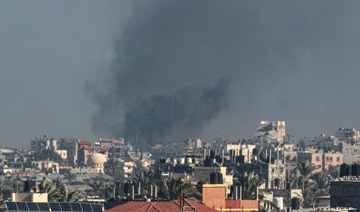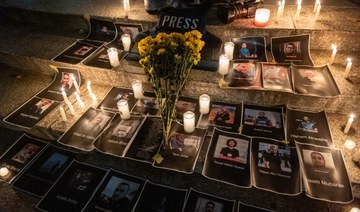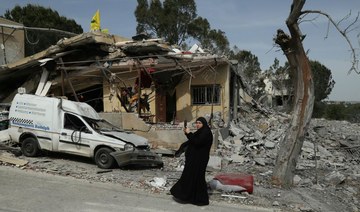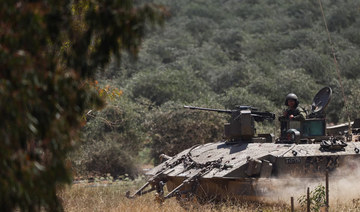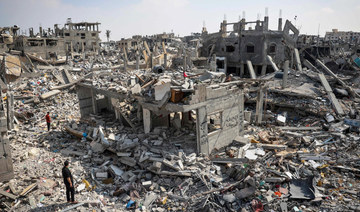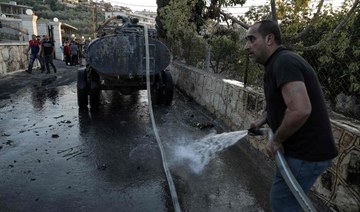ASHKELON, Israel: Effi Hajjaj has reopened his seafront stall in south Israel’s Ashkelon, offering coffee and snacks to beach-goers who are back in what he called a “victory” after almost 100 days of war.
Were it not for the sound of explosions from the besieged Gaza Strip, about 10 kilometers (six miles) down the coast, it may have appeared as a perfectly quiet day on the sandy beach.
“Victory means a return to routine, and a certain routine has returned,” said 55-year-old Hajjaj, whose business like many others had been shut after Hamas’s October 7 attack.
But behind the scene of normality, the trauma of the attack — the worst in Israel’s 75-year history — still looms large.
Palestinian militants stormed southern Israel and under a barrage of rockets, resulting in about 1,140 deaths, mostly civilians, according to an AFP tally based on official figures.
In response, Israel has vowed to eradicate Hamas, labelled a “terrorist” organization by the United States and the European Union.
A relentless Israeli military campaign has killed more than 23,700 people, mostly women and children, according to the health ministry in Hamas-ruled Gaza.
With fighting now mainly restricted to the narrow Palestinian territory, Israelis are for the most part protected from the violence but fear for captives held across the border and troops inside Gaza.
Around 250 hostages were seized on October 7, 132 of whom Israel says remain in Gaza.
“We have to keep going, move forward... but wherever we go, the conversations revolve around the hostages, around the things we’ve been through,” said Marina Michaeli, a 54-year-old real estate agent in Ashkelon.
“We’ve lost our joy,” she said.
Support for the war remains high among Israel’s Jewish majority, recent public opinion polls suggest.
In December, a Israel Democracy Institute survey found that 75 percent of Jewish Israelis were opposed to calls — including from close ally the United States — to reduce the intensity of bombing in populated areas.
And 80 percent felt that the suffering of Palestinian civilians should be given “little” or “very little” consideration in the context of the war, the poll said.
As soon as schools and shops reopened, many Ashkelon residents went on with their everyday lives.
And on the seafront, “people are going out again,” Hajjaj said.
On October 7, Palestinian militants reached the outskirts of the city.
But now, Hajjaj said, “there are hardly any rockets and they are no longer afraid of terrorist attacks.”
Most rockets fired from Gaza are intercepted by Israel’s Iron Dome air defense system.
Still, the hospital in Ashkelon has treated some 1,260 people for injuries related to the October 7 attacks or from rockets, according to a hospital spokeswoman.
Closer to Gaza as well as in areas along the Lebanese border, some 200,000 Israelis have been unable to return to their homes since the violence erupted.
The Israeli military has also called up 360,000 reservists in more than three months of war.
The army says at least 186 soldiers have been killed inside Gaza since the ground offensive began in late October.
Concern for soldiers, hostages and displaced Israelis means “we can’t talk about a return to normality,” said Denis Charbit, a political scientist at Israel’s Open University.
But he argued “Israeli resilience” is “the best revenge: to be deeply shaken, but to triumph with this incredible momentum and will to live.”
The stories of fallen soldiers and interviews with their families are all over TV and radio broadcasts, and posters of the hostages seem to cover every street corner.
Some are stamped with the word “Home” for those released, most of them during a one-week truce that began in November.
Others offer condolences: “May their memory be a blessing.”
While the “Bring them home now” campaign to free the remaining hostages keeps getting louder, there are also some signs of a return to pre-war life in Israel, a country of just over nine million.
Political controversies that had been put aside, most notably around the hard-right government’s judicial overhaul that last year divided the nation, have begun to reemerge.
And in early January, Israel announced it was sending several thousand reservists home in a bid to help boost the economy.
To support consumption, the Bank of Israel lowered interest rates for the first time since April 2022.
In Jerusalem, large crowds have returned to the city’s central Mahane Yehuda market, particularly at the start of the weekend.
“It’s wonderful to see people coming to shop... when everything used to be empty,” said Hanna Gabbay, 22.
“The country is still traumatized,” she said. “But life is stronger than anything, we have to keep going.”
In Israel’s north, a strip of land several kilometers along on the border with Lebanon has been evacuated due to clashes with Hamas-allied Hezbollah militants and fears of attacks on civilians.
In the south, the border with the Gaza Strip largely remains a no-go zone.
Most of Sderot’s 35,000 inhabitants have yet to return to their town just two kilometers from Gaza, where militants on October 7 killed at least 40 people.
Cats roam around a small square where a few shops have reopened but are struggling for customers. Only birdsong and the occasional passing car break the silence.
“We don’t feel safe,” said resident Eti Buhbut, 46.
“But we only have one country, and nowhere else to go.”
Israelis cautiously embrace ‘routine’ as Gaza war nears 100 days
https://arab.news/9e5cf
Israelis cautiously embrace ‘routine’ as Gaza war nears 100 days
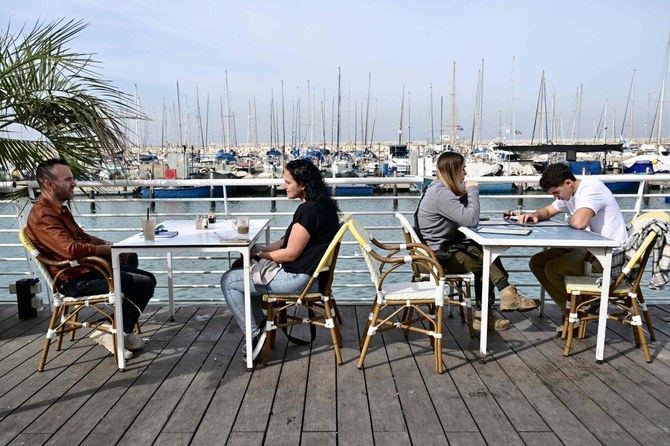
- A relentless Israeli military campaign has killed more than 23,700 people
- With fighting now mainly restricted to the narrow Palestinian territory, Israelis are for the most part protected from the violence
France’s foreign minister looks to prevent Israel-Hezbollah conflict escalation in Lebanon visit
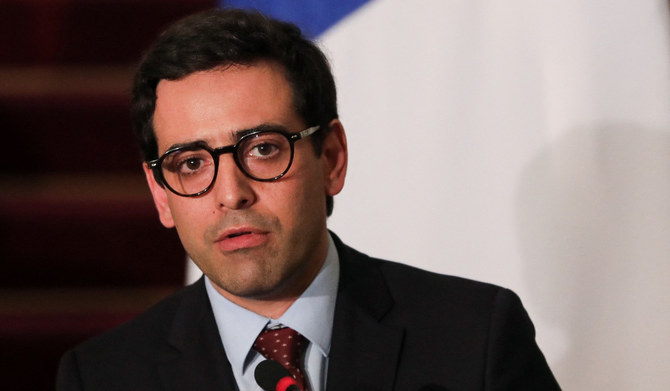
- Israel has killed more than 34,000 Palestinians, according to Gaza’s Health Ministry
- Israel has remained cautious on the French initiative, although Israeli and French officials say Israel supports efforts to defuse the cross-border tensions
BEIRUT: France’s foreign minister will push proposals to prevent further escalation and a potential war between Israel and Iran-backed Hezbollah during a visit to Lebanon on Sunday as Paris seeks to refine a roadmap that both sides could accept to ease tensions.
France has historical ties with Lebanon and earlier this year Stephane Sejourne delivered an initiative that proposed Hezbollah’s elite unit pull back 10 km (6 miles) from the Israeli border, while Israel would halt strikes in southern Lebanon.
The two have exchanged tit for tat strikes in recent months, but the exchanges have increased since Iran launched a barrage of missiles on Israel in response to a suspected Israeli attack on the Iranian embassy in the Syrian capital Damascus that killed members of Iran’s Revolutionary Guards Corps’ overseas Quds Force.
France’s proposal, which has been discussed with partners, notably the United States, has not moved forward, but Paris wants to keep momentum in talks and underscore to Lebanese officials that Israeli threats of a military operation in southern Lebanon should be taken seriously.
Hezbollah has maintained it will not enter any concrete discussion until there is a ceasefire in Gaza, where the war between Israel and Islamist militant group Hamas has entered its sixth month.
Israel has also said it wants to ensure calm is restored on its northern border so that thousands of displaced Israelis can return to the area without fear of rocket attacks from across the border.
“The objective is to prevent a regional conflagration and avoid that the situation deteriorates even more on the border between Israel and Lebanon,” foreign ministry deputy spokesperson Christophe Lemoine said at a news conference.
Lebanese Prime Minister Najib Nikati and Lebanese army chief Joseph Aoun met French President Emmanuel Macron earlier this month, where they discussed the French proposal.
In a letter addressed to the French embassy in Beirut in March, Lebanon’s foreign ministry said Beirut believed the French initiative would be a significant step toward peace and security in Lebanon and the broader region.
Local Lebanese media had reported the government had provided feedback to the French on the proposal.
French officials say the responses so far have been general and lack consensus among the Lebanese. While they deem it too early for any form of accord, they believe it is vital to engage now so that when the moment comes both sides are ready.
Paris will also underline the urgency of breaking the political deadlock in the country. Lebanon has neither a head of state nor a fully empowered cabinet since Michel Aoun’s term as president ended in October 2022.
Israel has remained cautious on the French initiative, although Israeli and French officials say Israel supports efforts to defuse the cross-border tensions.
“The flames will flicker and tensions will continue,” said a Lebanese diplomat. “We are in a situation of strategic ambiguity on both sides.”
France has 700 troops based in southern Lebanon as part of the 10,000-strong United Nations peacekeeping force.
Officials say the UN troops are unable to carry out their mandate and part of France’s proposals are aimed at beefing up the mission by strengthening the Lebanese army.
After Lebanon, Sejourne will head to Saudi Arabia before traveling to Israel.
Arab and Western foreign ministers, including US Secretary of State Antony Blinken, will hold informal talks on the sidelines of a World Economic Forum event in Riyadh to discuss the Gaza war with Palestinian President Mahmoud Abbas.
32 more killed in Gaza as Hamas studies new Israeli truce proposal
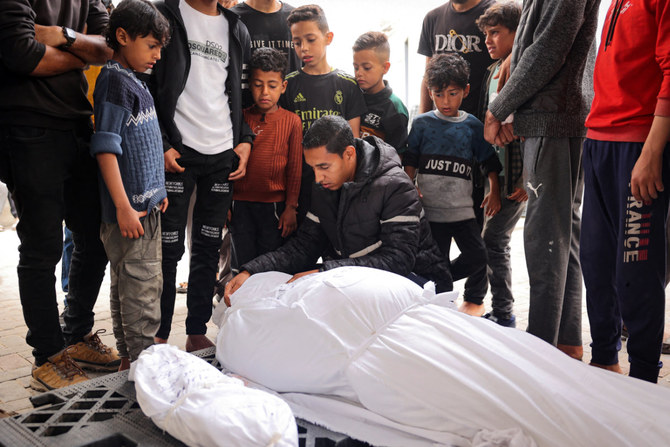
- Mediators working on compromise that will answer most of main demands
- Minister says Israel a deal could lead to suspension of planned Rafah offensive
JEDDAH/GAZA STRIP: Palestinians in Rafah said on Saturday they were living in “constant terror” as Israel vows to push ahead with its planned assault on the south Gaza city flooded with displaced civilians.
The Israeli military has massed dozens of tanks and armored vehicles in southern Israel close to Rafah and hit locations in the city in near-daily airstrikes.
“We live in constant terror and fear of repeated displacement and invasion,” said Nidaa Safi, 30, who fled Israeli strikes in the north and came to Rafah with her husband and children.
Gaza’s Health Ministry said at least 34,388 people have been killed in the besieged territory during more than six months of war between Israel and Hamas militants.
The tally includes at least 32 deaths in the past 24 hours, a ministry statement said, adding that 77,437 people have been wounded in the Gaza Strip since the war broke out when Hamas militants attacked Israel on Oct. 7.
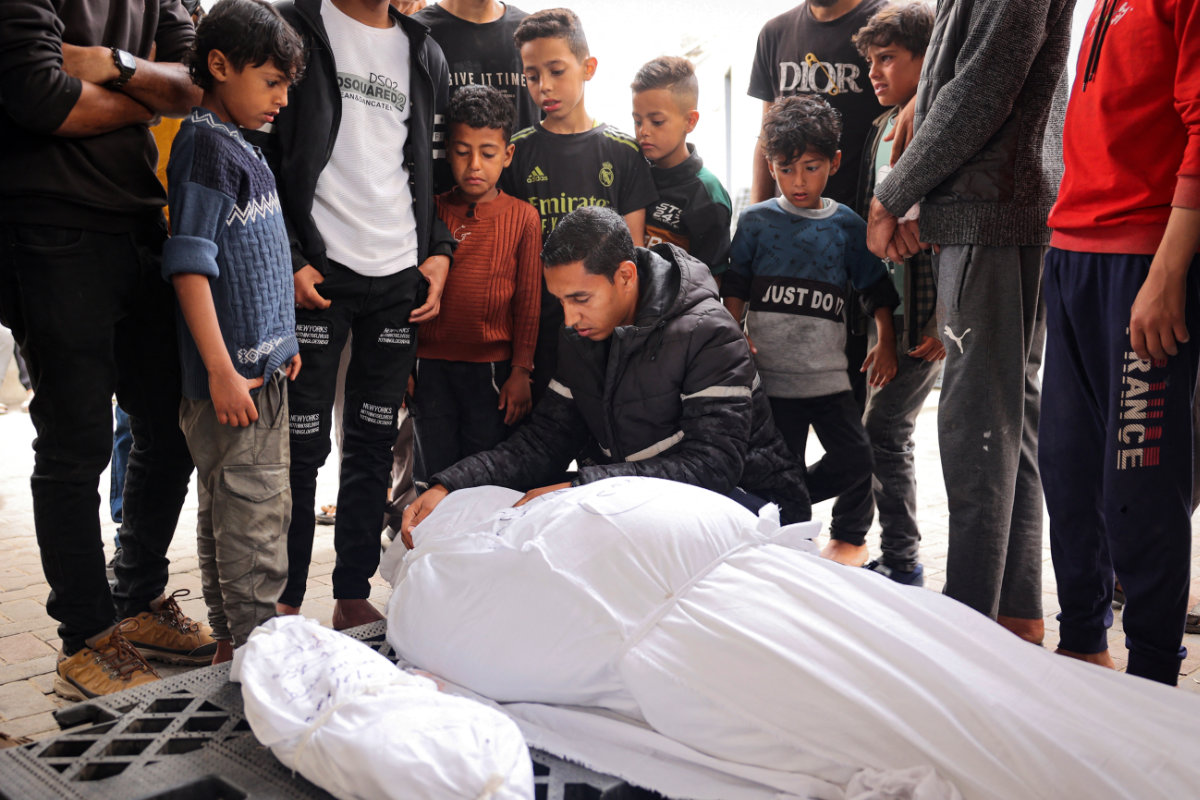
Early Saturday, an airstrike hit a house in Rafah’s Tel Sultan neighborhood, killing a man, his wife and their sons, ages 12, 10 and 8, according to records of the Abu Yousef Al-Najjar hospital’s morgue. A neighbor’s 4-month-old girl was also killed.
Ahmed Omar rushed with other neighbors after the 1:30 a.m. strike to look for survivors, but said they only found bodies and body parts. “It’s a tragedy,” he said.
An Israeli airstrike later Saturday on a building in Rafah killed seven people, including six members of the Ashour family, according to the morgue.
Five people were killed in the Nuseirat refugee camp in central Gaza overnight when an Israeli strike hit a house, according to officials at the Al-Aqsa Martyrs Hospital.
Elsewhere, Israeli forces shot and killed two Palestinian men at a checkpoint in the Israeli-occupied West Bank, the military said. It said the men had opened fire at troops stationed at Salem checkpoint near the city of Jenin.
Violence in the West Bank has flared since the war. The Ramallah-based Health Ministry says 491 Palestinians have been killed by Israeli fire.
Israel's counterproposal
Hamas said it was studying Israel’s latest counterproposal for a ceasefire, a day after reports said a delegation from mediator Egypt was in Israel trying to jump-start stalled negotiations.
Israel’s foreign minister said that the Rafah incursion could be suspended should there be a deal to secure the release of Israeli hostages.

“The release of the hostages is the top priority for us,” said Israel Katz. “If there will be a deal, we will suspend the operation.”
The Egyptian delegation discussed a “new vision” for a prolonged ceasefire in Gaza, according to an Egyptian official, who spoke on condition of anonymity to freely discuss the developments.
It wasn’t immediately clear whether Israel’s proposal was directly related to the visit.
Khalil Al-Hayya, deputy head of Hamas’s political arm in Gaza, said it had “received the official Zionist occupation response to the movement’s position, which was delivered to the Egyptian and Qatari mediators on April 13.”
Negotiations earlier this month centered on a six-week ceasefire proposal and the release of 40 civilian and sick hostages in exchange for freeing hundreds of Palestinian prisoners in Israeli jails.
A separate Hamas statement said leaders from the three main militant groups active in Gaza discussed attempts to end the war. It didn’t mention the Israeli proposal.
The armed wing of Hamas also released video footage of two men held hostage in Gaza, identified by Israeli campaign group the Hostages and Missing Families Forum as Keith Siegel and Omri Miran.
Mediators are working on a compromise that will answer most of both parties’ main demands, which could pave the way to continued negotiations with the goal of a deal to end the war, the official said.
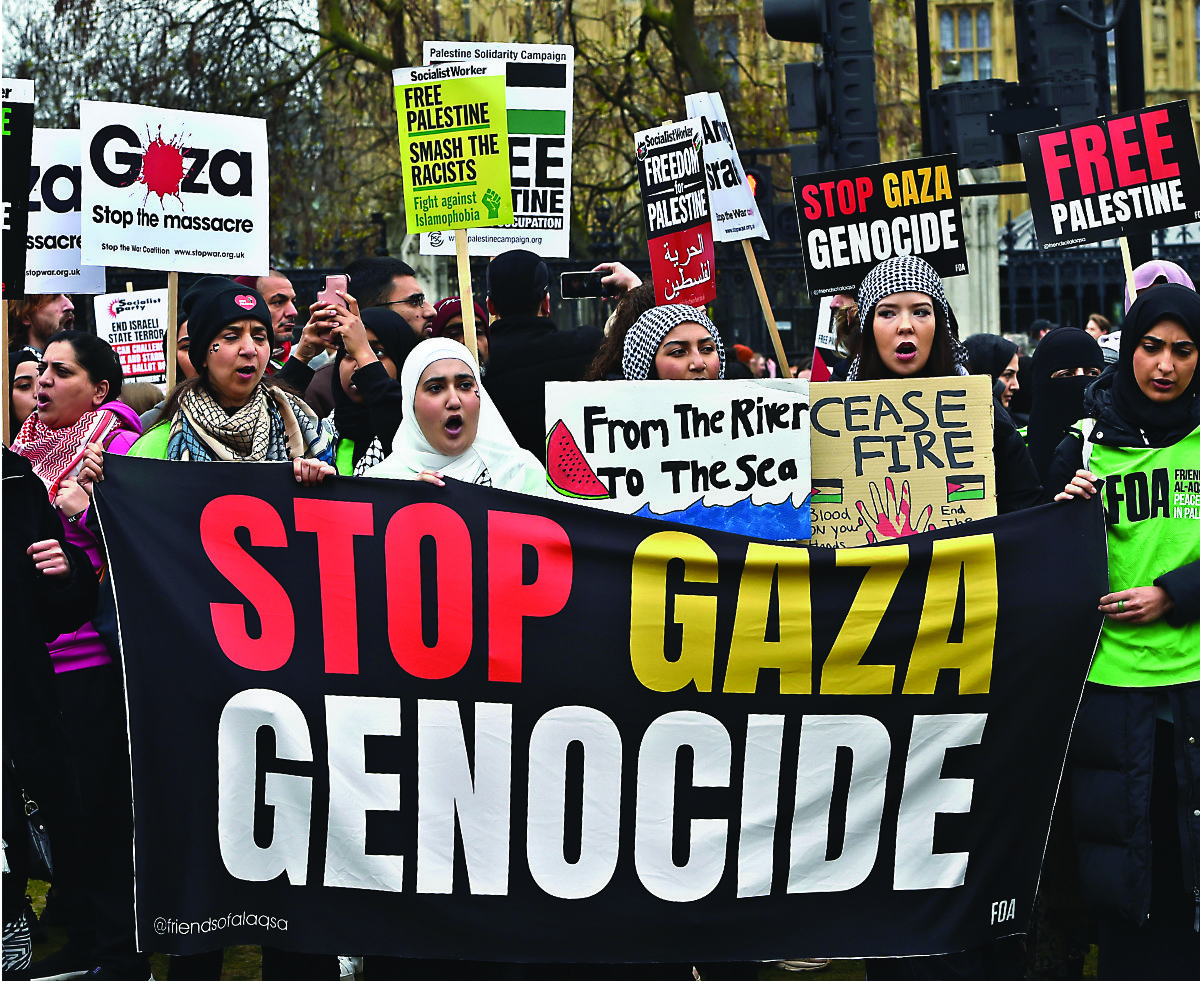
Hamas has said it won’t back down from demands for a permanent ceasefire and full withdrawal of Israeli troops.
Israel has rejected both and said it will continue military operations until Hamas is defeated and that it will retain a security presence in Gaza.
There is growing international pressure for Hamas and Israel to reach a ceasefire deal and avert an Israeli attack on Rafah, where more than half of Gaza’s 2.3 million people have sought refuge.
Israel has insisted for months it plans a ground offensive into Rafah, on the border with Egypt, where it says many remaining Hamas militants remain, despite calls for restraint including from Israel’s staunchest ally, the United States.
Egypt has cautioned an offensive into Rafah could have “catastrophic consequences” on the humanitarian situation in Gaza, where famine is feared, and on regional peace and security.
Tolerating Israeli abuses
Washington has been critical of Israeli policies in the West Bank. US Secretary of State Antony Blinken, who is expected in Israel on Tuesday, recently determined an army unit committed rights abuses there before the war in Gaza.
But Blinken said in an undated letter to US House Speaker Mike Johnson, obtained by The Associated Press on Friday, that he’s postponing a decision on blocking aid to the unit to give Israel more time to right the wrongdoing. Blinken stressed that overall US military support for Israel’s defense wouldn’t be affected.
The US has also been building a pier to deliver aid to Gaza through a new port. Israel’s military confirmed Saturday that it would be operational by early May.
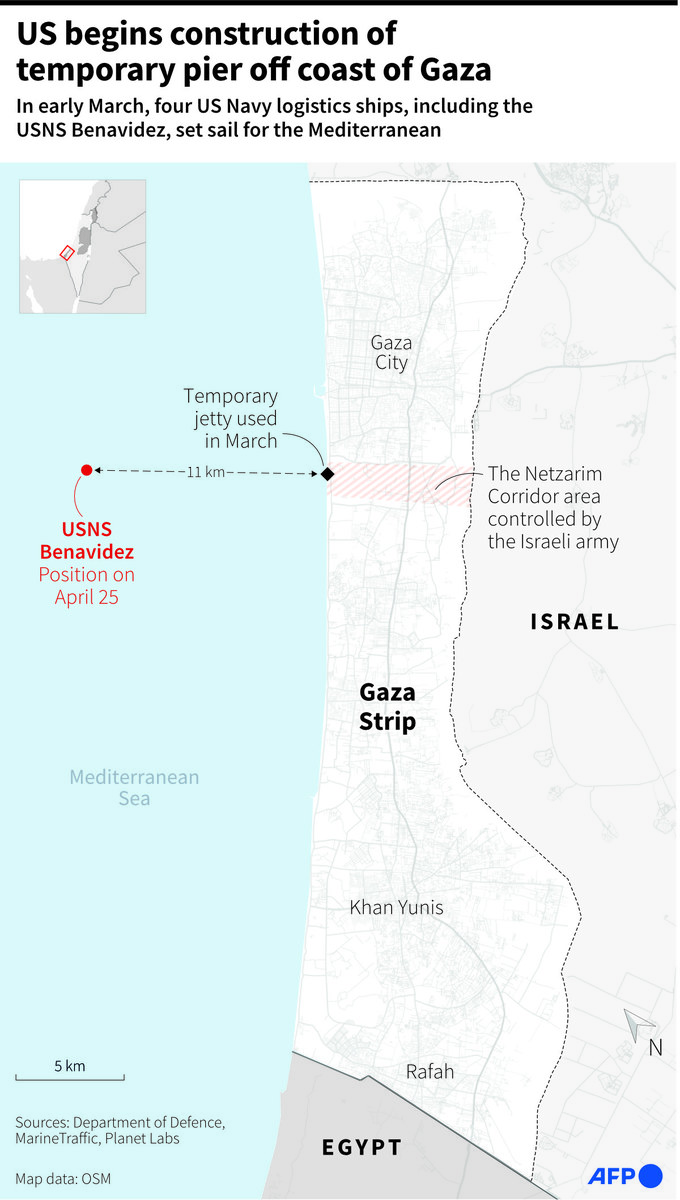
The BBC reported the UK government was considering deploying troops to drive the trucks to carry the aid to shore, citing unidentified government sources. British officials declined to comment.
Another aid effort, a three-ship flotilla coming from Turkiye, was prevented from sailing, organizers said.
Student protests over the war and its effect on Palestinians are growing on college campuses in the US, while demonstrations continue in many countries.
Hamas sparked the war by attacking southern Israel on Oct. 7, with militants killing around 1,200 people, mostly civilians, and taking around 250 hostage. Israel says the militants still hold around 100 hostages and the remains of more than 30 others.
Sudan demands emergency UN meeting on UAE ‘aggression’
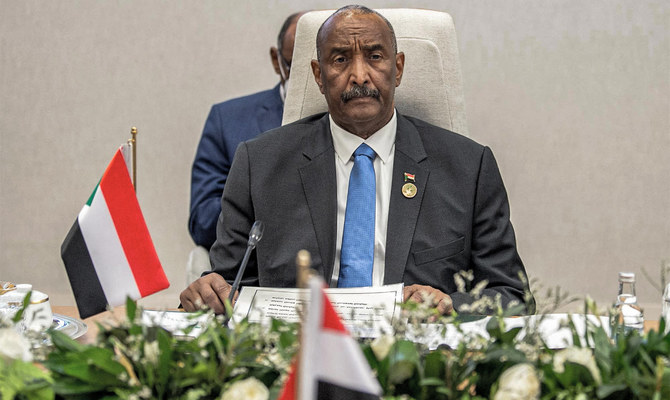
- For months the regular army has accused the United Arab Emirates of supporting the RSF, a charge the UAE denies
PORT SUDAN, Sudan: Sudan has requested an emergency UN Security Council meeting on what it calls UAE “aggression” for allegedly supporting paramilitaries battling the army, a diplomatic source said Saturday.
The fighting broke out in April last year between the regular army, headed by Sudan’s de facto leader Abdel Fattah Al-Burhan, and the paramilitary Rapid Support Forces (RSF) led by his former deputy Mohamed Hamdan Dagalo.
For months the regular army has accused the United Arab Emirates of supporting the RSF, a charge the UAE denies.
“Yesterday, our permanent representative to the United Nations submitted a request for an urgent session of the Security Council to discuss the UAE’s aggression against the Sudanese people, and the provision of weapons and equipment to the terrorist militia,” the source told AFP.
The country’s official SUNA news agency confirmed that Sudan’s UN representative, Al-Harith Idriss, had submitted the request.
SUNA cited Idriss as saying this was “in response to the UAE representative’s memorandum to the Council,” and that “the UAE’s support for the criminal Rapid Support militia that waged war on the state makes the UAE an accomplice in all its crimes.”
In a letter to the Security Council last week, the UAE foreign ministry rejected Sudan’s accusations that it backs the RSF.
The letter said the allegations were “spurious (and) unfounded, and lack any credible evidence to support them.”
Separately on Saturday, the UN Security Council expressed “deep concern” over escalating fighting in Sudan’s North Darfur region and warned against the possibility of an imminent offensive by the RSF and allied militias on El Fasher.
The city is the last Darfur state capital not under RSF control and hosts a large number of refugees.
United Nations officials put out similar warnings Friday, with the UN’s High Commissioner for Human Rights Volker Turk expressing his “grave concern.”
Secretary-General Antonio Guterres’ spokesperson’s office said an attack on El Fasher “would have devastating consequences for the civilian population... in an area already on the brink of famine.”
The Sudan war has killed tens of thousands of people and forced more than 8.5 million people to flee their homes in what the United Nations has called the “largest displacement crisis in the world.”
In December, Khartoum demanded that 15 Emirati diplomats leave the country after an army commander accused Abu Dhabi of supporting the RSF, and protests in Port Sudan demanded the expulsion of the UAE ambassador.
The Wall Street Journal, citing Ugandan officials, reported last August that weapons had been found in a UAE cargo plane transporting humanitarian aid to Sudanese refugees in Chad, prompting a denial from Abu Dhabi.
Hezbollah says fires drones and guided missiles at Israel
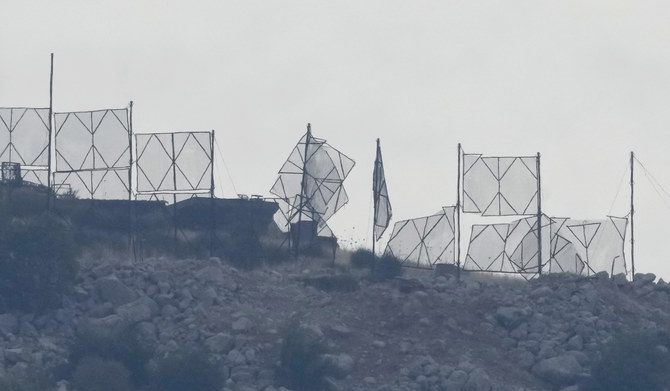
- The border between Lebanon and Israel has seen near-daily exchanges of fire since the Israel-Hamas war in Gaza began nearly seven months ago
BEIRUT: Lebanon’s Iran-backed Hezbollah movement said Saturday it had targeted northern Israel with drones and guided missiles after cross-border Israeli strikes killed three people, including two of its members.
A statement from the group said it “launched a complex attack using explosive drones and guided missiles on the headquarters of the Al Manara military command and a gathering of forces from the 51st Battalion of the Golani Brigade.”
The Israeli army said its Iron Dome air-defense system “successfully intercepted a suspicious aerial target that crossed from Lebanon into the area of Manara in northern Israel.”
The army also “struck the sources of fire” of several anti-tank missiles launched from Lebanon into the Manara border area, it added.
Lebanon’s National News Agency later reported that an Israeli air strike on a house in Srebbine village had wounded 11 people, one seriously.
Earlier Saturday, Israeli fighter jets “struck a Hezbollah military structure in the area of Qouzah in southern Lebanon,” the army said in a statement.
The border between Lebanon and Israel has seen near-daily exchanges of fire since the Israel-Hamas war in Gaza began nearly seven months ago.
In two separate statements earlier Saturday, Hezbollah mourned the deaths of two fighters from the villages of Kafr Kila and Khiam.
It said they had been “martyred on the road to Jerusalem,” the phrase it uses to refer to members killed by Israeli fire.
Hezbollah has intensified its targeting of military sites in Israel since tensions soared between Israel and Iran over the bombing of Tehran’s Damascus consulate on April 1, widely blamed on Israel.
Iran to release crew members of seized Portugal-flagged ship
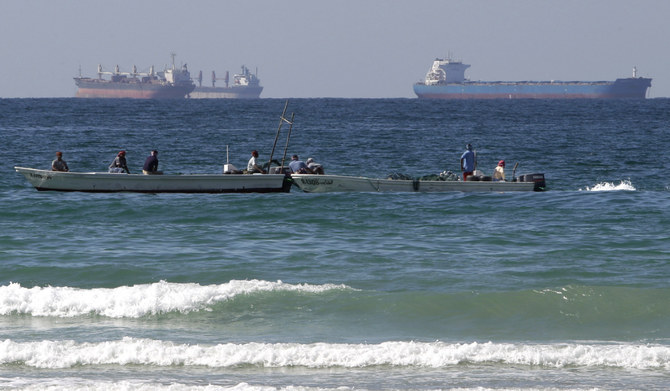
- The ship’s seizure took place hours before Iran carried out its first-ever direct attack on Israel, launching hundreds of drones and missiles
TEHRAN: Iran said on Saturday it would release the crew members of a Portuguese-flagged ship that its forces seized this month in the Gulf.
The Revolutionary Guard Corps took over the MSC Aries with 25 crew members on board near the Strait of Hormuz on April 13.
Tehran later said the ship belonged to its Israel and was being investigated for alleged violations of international maritime law.
“The humanitarian issue of the release of the ship’s crew is of great concern to us,” Iran’s Foreign Minister Hossein Amir-Abdollahian said in a phone call with his Portuguese counterpart Paulo Rangel.
BACKGROUND
The ship’s seizure took place hours before Iran carried out its first-ever direct attack on Israel, launching hundreds of drones and missiles.
“We have given consular access to their ambassadors in Tehran and announced to the envoys that the crew members will be released and extradited,” he was quoted as saying in a statement from his ministry, without elaborating.
Following the ship’s seizure, Portugal summoned Iran’s ambassador to demand its immediate release.
On April 18, India said one of the 17 Indian crew members had returned home and that the others were granted consular access.
“They are in good health and not facing any problems on the ship. As for their return, some technicalities are involved,” an Indian Foreign Ministry spokesman said on Thursday.
The ship’s seizure took place hours before Iran carried out its first-ever direct attack on Israel, launching hundreds of drones and missiles.
The Israeli military said nearly all of the projectiles were intercepted.
Israel and the US have denounced the seizure of the ship as an act of “piracy.”
Regional tensions have soared since war broke out nearly seven months ago between Israel and Palestinian militant group Hamas in the Gaza Strip.



